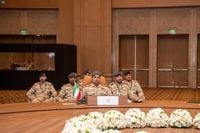The Kingdom of Saudi Arabia hosted the eighth meeting of the "Dragon" group on Sunday, April 13, 2025, at the Ministry of Defense in Riyadh. This strategic assembly brought together military leaders and representatives from Bahrain, the Sultanate of Oman, Qatar, Kuwait, Egypt, Iraq, Jordan, Britain, and Ireland. The primary focus was on enhancing maritime security, combating terrorism, and addressing humanitarian issues in the Palestinian territories.
The meeting, which was opened by the head of the General Authority of Civil Aviation, Friaq Al-Awal Rakan Fayad Al-Ruwaili, emphasized the importance of protecting vital maritime routes. Participants highlighted the need for improved cooperation in countering piracy and smuggling activities that threaten regional stability.
According to the Saudi Press Agency (SPA), the discussions also included critical topics such as the ongoing humanitarian crisis in Gaza, where the situation has deteriorated significantly since October 7, 2023. Reports indicate that Israeli military actions, supported by the United States, have led to over 167,000 casualties among Palestinians, with many of the victims being women and children. Moreover, more than 11,000 individuals are currently missing, raising urgent calls for humanitarian aid.
Established in 2018, the "Dragon" group, named after the British Royal Navy's frigate HMS Dragon, aims to foster security cooperation among its member states. The frigate, one of four Type 45 ships in the British fleet, initially hosted the group during its first meeting. The name symbolizes the collective strength and commitment to addressing shared security challenges in the region.
During this latest meeting, the leaders reiterated the necessity of ensuring the safety of maritime navigation and maintaining the integrity of international waters. The discussions also touched upon the broader implications of regional conflicts, particularly the escalating tensions in the Palestinian territories, which have prompted international concern and calls for immediate humanitarian assistance.
As the meeting progressed, representatives voiced their commitment to collaborative efforts in counter-terrorism and the stabilization of the region. The group aims to create a unified front against threats that could undermine peace and security in the Gulf and beyond.
The significance of this gathering cannot be overstated, especially in light of the current geopolitical climate. With rising tensions and conflicts in various parts of the Middle East, the "Dragon" group serves as a platform for dialogue and cooperation among military leaders who share a vested interest in regional security.
In addition to counter-terrorism efforts, the meeting underscored the importance of humanitarian initiatives aimed at alleviating the suffering of those affected by ongoing conflicts. The situation in Gaza has drawn international condemnation, with many leaders calling for immediate action to address the humanitarian crisis.
The discussions at the "Dragon" group meeting reflect a growing recognition of the interconnectedness of security and humanitarian issues. As military leaders strategize on how to combat terrorism and piracy, they are also acutely aware of the pressing need to provide humanitarian aid to those in dire circumstances.
Looking ahead, the outcomes of this meeting could shape future collaborations among member states, as they seek to bolster maritime security and enhance their collective response to regional threats. The ongoing crisis in Gaza, coupled with the need for effective counter-terrorism strategies, highlights the urgency of these discussions.
In conclusion, the eighth meeting of the "Dragon" group marks a pivotal moment for military cooperation in the region. As leaders come together to address pressing security issues, the hope is that their collective efforts will lead to improved stability and peace in a region fraught with challenges.




